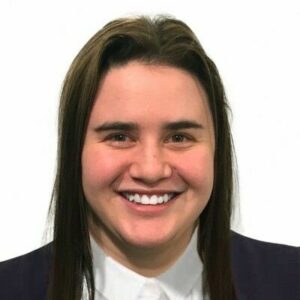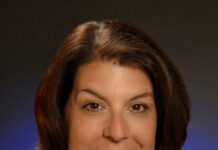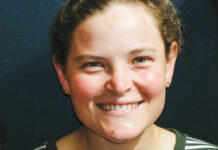
As a Type 1 diabetic herself, Dr. Jordan Perlman, 35, understands the hardships of dealing with diabetes.
Growing up in Washington, D.C., proper, Perlman had a passion for medicine. After graduating from Cornell University, she went on to the University of Vermont for medical school. Following graduation, Perlman completed a residency program in internal medicine at the University of Washington Medical Center. Now, she practices adult endocrinology at Johns Hopkins Medicine.
Perlman lives in Fells Point with her 15-year-old cat Scout.
Why did you decide to practice medicine?
Most people say to help people, and that’s definitely part of it. For me, I really like the fact that I can use emerging science in endocrinology to help patients. My focus in my practice is on new technology for diabetes and working on the biotech side in terms of making that technology more accessible to people like geriatric patients with dementia, people with developmental disabilities or people with dexterity issues who physically can’t use the technology. I really like being able to figure out ways to make new innovations accessible to all patients.
How did you get into endocrinology specifically?
I myself have Type 1 diabetes, and I was trying not to end up in endocrinology for that specific reason. But I ended up really liking endocrinology. I was raised by two lawyers. So, I was raised to think very logically. It kind of came naturally to me. Then I ended up in the diabetes tech sector because I really like taking things apart and putting things back together, building things.
I’m not an engineer, but I feel like maybe in a different life I could have been. I really like playing with the technology. That’s how I ended up in the diabetes realm specifically. It helps to have Type 1 diabetes because I think I’m better able to empathize with what some of these patients are going through specifically in the insurance coverage and dealing with all of the hoops and the hurdles that you have to go through to get the technology that you need to take care of diabetes. The world makes it very hard for people.
You also teach at Johns Hopkins?
I teach endocrinology and diabetes. So, I teach medical students, residents and fellows. I really like to be able to help people train the way that they think. Everyone says medical school is like drinking through a garden hose. There’s all this information that you have to learn and retain. In my experience, medicine and endocrinology are about training your brain to think in a certain way. I really like helping people develop those critical thinking skills.
What are some things you are looking for in a synagogue?
I’m looking for a Conservative [synagogue]. Honestly, my problem is I don’t really know how to pick a synagogue. I’ve had to ask my more religious friends how to help me, but I was raised Conservative, and I feel like there aren’t really a lot of Conservative synagogues left. You know you have to either go one way or the other. If I go to a Reform synagogue, I don’t recognize all of the melodies, and there’s more English than I’m used to. I grew up belonging to Adas Israel Congregation in D.C.
What is your favorite Jewish memory?
My favorite Jewish memory is growing up going to a breakfast with some very old friends of my father’s. Every year we’d go, and there’d be 50 to 75 people there, and it’d be the same 50 to 75 people. You sort of watch people grow up and change. The food was always really good.
They had a bagel buffet with like lox and cream cheese and all of these different side dishes. They still do it. Thirty-five years later, they still do it. Everyone saying the blessings together in a group and there were kids running everywhere.







